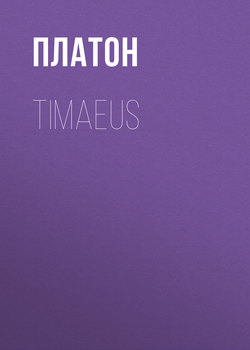Читать книгу Timaeus - Платон - Страница 3
Section 2
ОглавлениеNature in the aspect which she presented to a Greek philosopher of the fourth century before Christ is not easily reproduced to modern eyes. The associations of mythology and poetry have to be added, and the unconscious influence of science has to be subtracted, before we can behold the heavens or the earth as they appeared to the Greek. The philosopher himself was a child and also a man – a child in the range of his attainments, but also a great intelligence having an insight into nature, and often anticipations of the truth. He was full of original thoughts, and yet liable to be imposed upon by the most obvious fallacies. He occasionally confused numbers with ideas, and atoms with numbers; his a priori notions were out of all proportion to his experience. He was ready to explain the phenomena of the heavens by the most trivial analogies of earth. The experiments which nature worked for him he sometimes accepted, but he never tried experiments for himself which would either prove or disprove his theories. His knowledge was unequal; while in some branches, such as medicine and astronomy, he had made considerable proficiency, there were others, such as chemistry, electricity, mechanics, of which the very names were unknown to him. He was the natural enemy of mythology, and yet mythological ideas still retained their hold over him. He was endeavouring to form a conception of principles, but these principles or ideas were regarded by him as real powers or entities, to which the world had been subjected. He was always tending to argue from what was near to what was remote, from what was known to what was unknown, from man to the universe, and back again from the universe to man. While he was arranging the world, he was arranging the forms of thought in his own mind; and the light from within and the light from without often crossed and helped to confuse one another. He might be compared to a builder engaged in some great design, who could only dig with his hands because he was unprovided with common tools; or to some poet or musician, like Tynnichus (Ion), obliged to accommodate his lyric raptures to the limits of the tetrachord or of the flute.
The Hesiodic and Orphic cosmogonies were a phase of thought intermediate between mythology and philosophy and had a great influence on the beginnings of knowledge. There was nothing behind them; they were to physical science what the poems of Homer were to early Greek history. They made men think of the world as a whole; they carried the mind back into the infinity of past time; they suggested the first observation of the effects of fire and water on the earth's surface. To the ancient physics they stood much in the same relation which geology does to modern science. But the Greek was not, like the enquirer of the last generation, confined to a period of six thousand years; he was able to speculate freely on the effects of infinite ages in the production of physical phenomena. He could imagine cities which had existed time out of mind (States.; Laws), laws or forms of art and music which had lasted, 'not in word only, but in very truth, for ten thousand years' (Laws); he was aware that natural phenomena like the Delta of the Nile might have slowly accumulated in long periods of time (Hdt.). But he seems to have supposed that the course of events was recurring rather than progressive. To this he was probably led by the fixedness of Egyptian customs and the general observation that there were other civilisations in the world more ancient than that of Hellas.
The ancient philosophers found in mythology many ideas which, if not originally derived from nature, were easily transferred to her – such, for example, as love or hate, corresponding to attraction or repulsion; or the conception of necessity allied both to the regularity and irregularity of nature; or of chance, the nameless or unknown cause; or of justice, symbolizing the law of compensation; are of the Fates and Furies, typifying the fixed order or the extraordinary convulsions of nature. Their own interpretations of Homer and the poets were supposed by them to be the original meaning. Musing in themselves on the phenomena of nature, they were relieved at being able to utter the thoughts of their hearts in figures of speech which to them were not figures, and were already consecrated by tradition. Hesiod and the Orphic poets moved in a region of half-personification in which the meaning or principle appeared through the person. In their vaster conceptions of Chaos, Erebus, Aether, Night, and the like, the first rude attempts at generalization are dimly seen. The Gods themselves, especially the greater Gods, such as Zeus, Poseidon, Apollo, Athene, are universals as well as individuals. They were gradually becoming lost in a common conception of mind or God. They continued to exist for the purposes of ritual or of art; but from the sixth century onwards or even earlier there arose and gained strength in the minds of men the notion of 'one God, greatest among Gods and men, who was all sight, all hearing, all knowing' (Xenophanes).
